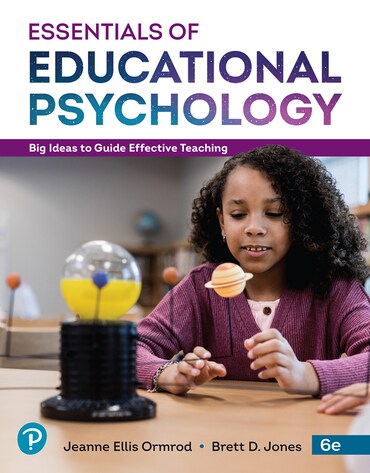
Essentials of Educational Psychology: Big Ideas To Guide Effective Teaching, 6th edition
- Jeanne Ellis Ormrod |
- Brett D. Jones |
Title overview
For introductory courses in educational psychology.
A concise guide to the psychology of effective teaching
Essentials of Educational Psychology focuses on the big ideas that impact teaching and learning in 10 concise, conversational chapters. It offers an overview of theories and research related to learning, development, motivation and assessment. Exercises help students understand concepts by examining their own learning. Research-based strategies show students how to apply these concepts as teachers.
The 6th Edition more seamlessly connects theories to principles, and principles to teaching strategies. Enhanced with new figures and references, it reflects current research and strategies.
Hallmark features of this title
- Big Ideas at the start of each chapter focus on fundamental concepts and principles that have broad applicability to classroom practice. Case studies situate the Big Ideas in a realistic scenario.
- Authentic classroom artifacts help connect concepts, principles and strategies to real student behavior and educator practice.
- Guiding Principles and Key Strategies highlight major points and recommendations for classroom planning and practice.
- See for Yourself and Think About It ask teachers to place themselves in the role of a student or reflect on their own learning experience.
- Developmental Trends tables summarize age-typical characteristics at 4 grade levels.
- Classroom Strategies offer concrete suggestions of how teachers can apply a specific concept or principle.
New and updated features of this title
Reflect new research findings and evidence-based classroom strategies
- NEW: Teaching Strategies subsections immediately tie the chapter-opening principles presented in the Big Ideas to their application. Content throughout the chapter strengthens the connection between the principles and strategies.
- NEW: Specific psychological theories from prominent theorists are integrated throughout the text. Teachers will see how theory directly influences the Big Ideas and principles presented.
- NEW: Over 500 new references provide readers with the most current and relevant research. New keywords and definitions reflect current research.
- NEW: Over 90 new figures summarize or present the concepts explained in an easy-to-understand way.
The LMS-Compatible Assessment Bank streamlines assignments and grading
- NEW: Learning Outcome Quizzes are assignable for each chapter Big Idea. Questions include feedback for the correct answer and for each distractor.
- NEW: Application Exercises give students opportunities to apply their knowledge of each Big Idea. Each exercise includes a model response written by experts.
Key features
Features of Pearson eText for the 6th Edition
- Video Examples, including authentic classroom videos and interviews with experts in the field, expand on principles or concepts in each chapter, helping put the reading into context.
- Content Extensions dive deeper into a specific theory or topic presented in the text with more details, background or context.
Table of contents
- Introduction to Educational Psychology
- Learning, Cognition, and Memory
- Complex Cognitive Processes
- Learning in Context
- Motivation and Emotions
- Cognitive Development
- Personal, Social, and Moral Development
- Instructional Strategies
- Strategies for Creating Effective Classroom and School Environments
- Assessment Strategies
APPENDICES
- Describing Associations with Correlation Coefficients
- Understanding and Interpreting Standardized Test Results
Author bios
About our authors
Jeanne Ellis Ormrod received her A.B. in psychology from Brown University and her M.S. and Ph.D. in educational psychology from The Pennsylvania State University. She earned licensure in school psychology through postdoctoral work at Temple University and the University of Colorado at Boulder and has worked as a middle school geography teacher and school psychologist. Dr. Ormrod was Professor of Educational Psychology at the University of Northern Colorado (UNC) until 1998 and is currently Professor Emerita in UNC's School of Psychological Sciences. She has published and presented extensively on cognition and memory, cognitive development, instruction, and related topics but is probably best known for this book and four others: Human Learning (currently in its 8th edition); Educational Psychology: Developing Learners (10th edition, coauthored with Eric Anderman and Lynley Anderman); Child Development and Education (coauthored with Teresa McDevitt, currently in its 7th edition); and Practical Research (coauthored with Paul Leedy, currently in its 12th edition). After raising three children (two of whom have become teachers themselves), she now lives in New Hampshire with her husband, Richard. Within the past few years, she has had the good fortune to visit schools in diverse cultural settings, including Rwanda, Tanzania, Thailand, Malaysia, and Peru's Amazon region.
Brett D. Jones is Professor of Educational Psychology in the School of Education at Virginia Tech (Virginia Polytechnic Institute and State University). He received his B.A.E. in architectural engineering from The Pennsylvania State University and his M.A. and Ph.D. in educational psychology from the University of North Carolina at Chapel Hill. Dr. Jones has held faculty positions as an educational psychologist at Duke University, the University of South Florida St. Petersburg, and Virginia Tech. He has taught over 20 different types of university courses related to motivation, cognition, and teaching strategies. Dr. Jones has also conducted workshops and invited presentations at many universities and has presented more than 150 research papers at conferences. His research, which includes examining instructional methods that support students' motivation and learning, has led to more than 100 research articles, several book chapters, and two other books (Motivating Students by Design: Practical Strategies for Professors and The Unintended Consequences of High-Stakes Testing, the latter of which was coauthored with M. Gail Jones and Tracy Hargrove). He and his wife stay busy with their two children, who enjoy school, athletics, and cheering for the Hokies, Nittany Lions, and Tar Heels.